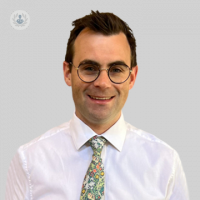Trigger finger: symptoms, causes, and treatment
Written by:Top Doctors recently had the pleasure of speaking with distinguished consultant plastic, reconstructive, and hand surgeon, Mr Alexander Armstrong all about trigger finger. Here, in this article below, Mr Armstrong explains what exactly trigger finger is, and details when surgery is required for the condition.

What is trigger finger?
Trigger finger is a condition where a finger gets stuck in a bent position and then pops straight with a sudden snap, like pulling a trigger.
What causes trigger finger?
Trigger finger is caused by a problem with the tendons that bend the fingers. This can happen when the tendons become irritated, inflamed, or develop a build-up of scar tissue. This nodular scar on the tendon can catch on the roof of the tendon sheath that it glides through, causing a painful popping or clicking sensation.
There are several factors that can increase the risk of developing trigger finger, including repetitive hand movements or gripping, medical conditions such as arthritis, diabetes, and gout, age (as the condition is more common in people over 40), gender (as women are more likely to develop trigger finger than men), and previous hand or wrist injuries.
What are the symptoms of trigger finger?
The main symptoms of trigger finger are pain or tenderness at the base of the affected finger, especially when you try to straighten it; stiffness in the affected finger, especially in the morning or after periods of inactivity; a popping or clicking sensation when you move the affected finger; a tendency for the affected finger to get stuck in a bent position and then suddenly pop straight, like pulling a trigger; and a lump or bump at the base of the affected finger. In severe cases, the affected finger may be locked in a bent position and unable to straighten.
When is surgery recommended?
Surgery is usually recommended for trigger finger when conservative treatments, such as rest, splinting, steroid injections, or physiotherapy, have failed to relieve the symptoms. Surgery may also be recommended if you have a persistent case of trigger finger that is causing significant pain, affecting your ability to perform daily activities, or if the affected finger is locked in a bent position and unable to straighten.
It is uncommon for trigger finger to return after surgery. However, to minimise the risk of recurrence, it's important to follow proper post-op care and engage in physiotherapy or other exercises.
If you wish to consult with Mr Alexander Armstrong today, visit his Top Doctors profile to do just that.


